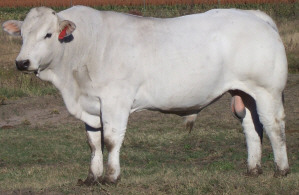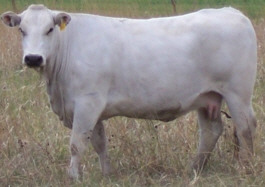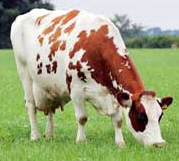



Marchigiana
History
The Marchigiana (pronounced as mar-key-jar-nah) origins are unsettled, the American International Marchigiana Society state that the breed descended from Asiatic cattle that were brought to Italy during the fourth Century AD following the barbarian invasions.And another version, put forth by Dr. Briggs in Modern Breeds of Livestock, is that it is a relatively new breed, being differentiated as late as 1933 and known locally at the time as the Improved Marche.
According to this version, the indigenous stock of the area had been intermixed with the Chianina and two other varieties of mountain cattle. Selection then followed for the large type of cattle which were desired on the lower and more fertile slopes of the region where forage was more abundant.
 Photo courtesy of the American Marchigiana Society , www.marchigiana.org |
Today the Marchigiana is a competitive beef breed which is widespread throughout the Marches, Labium, Abruzzo and Campania areas of Italy. Approximately 50,000 head are registered with the Italian Herd Book and it constitutes approximately 45% of all white cattle breeds (Marchigiana, Chianina, Romagnola, Polodica and Maremmana) in Italy. This breed has been exported across the world.
The Marchigiana is also known by the name Del Cubante Avellino.
Characteristics
The Marchigiana is very similar to the Chianina, it short haired and varies in colour from light grey to almost white. Their skin is pigmented with the tongue and muzzle being black, around their eyes and tail being dark. They are horned (but are also bred polled mainly in the USA) which are yellow cast at the base rising to white and black at the tips and are of a medium size.This breed is large and muscular with a fine bone structure, the cows weigh approximately 1300-1500 lbs and the bulls 2000-2400 lbs. The calves weigh an average of 80 to 85 lbs. at birth.
In conformation it has a cylindrical trunk with improved muscle development in the buttocks and thighs.
A precocious breed, it reaches its ideal slaughter weight at the age of 15-16 months, for a yield as high as 67%.
Statistics
 Photo courtesy of the American Marchigiana Society , www.marchigiana.org |
Comparative
Distribution
The Marchigiana has been exported to many countries including the United States, Canada, Mexico, Brazil, Argentina, Great Britain, the Netherlands, New Zealand and Australia.References (the above information was cited from the following sites)
www.ansi.okstate.edu
www.marchigiana.org


